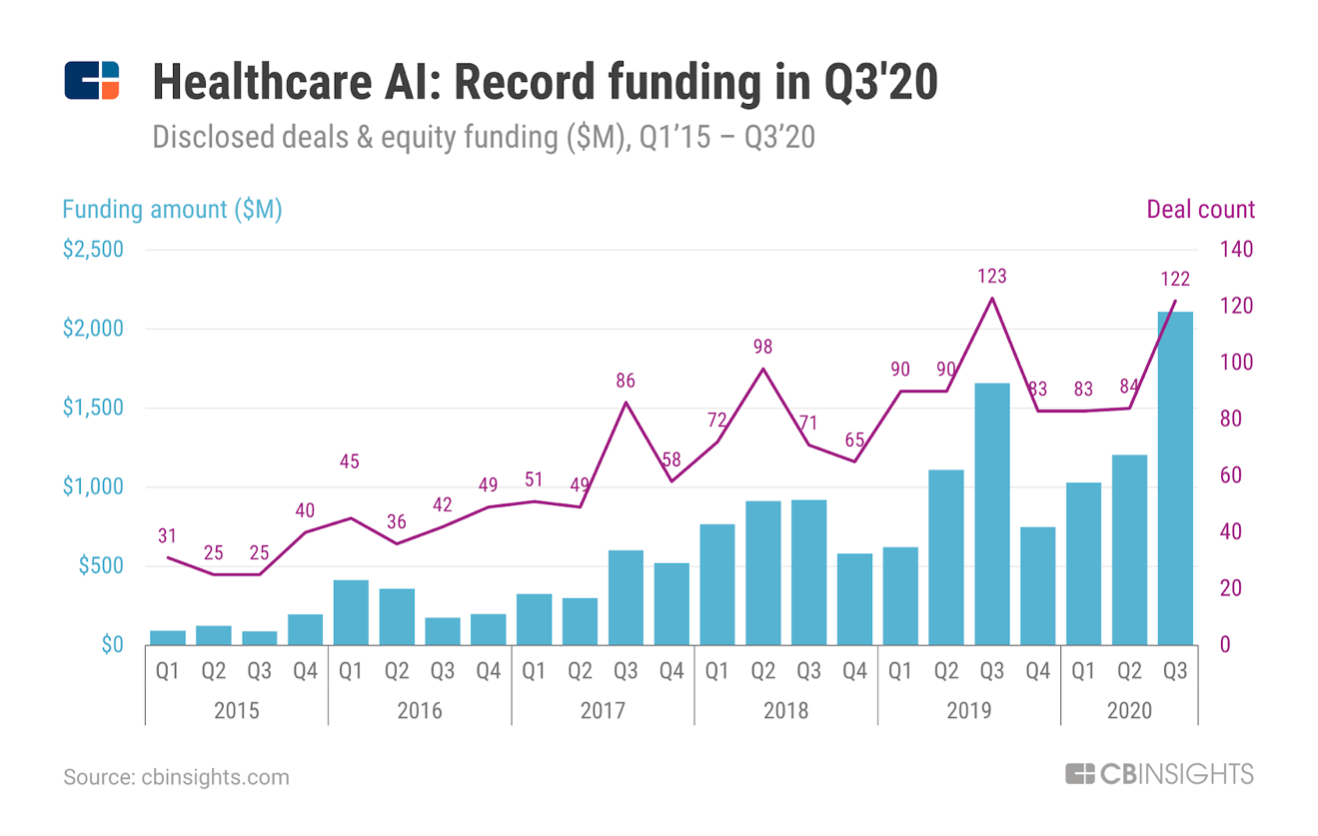
Could Artificial Intelligence Pave the Way for Fairer Health Insurance?
The COVID-19 pandemic has been a testing time for healthcare services around the world, but it’s also played a key role in reminding us all about the significance of high quality and technologically advanced care for all. With AI developing at a rapid rate, could further advancements pave the way for fairer health insurance globally?
Healthcare is an industry that’s ripe for innovation around the world, and with a global health crisis serving as a stark reminder of the importance of medical investment, we may see artificial intelligence solutions implemented at a faster pace.

(Image: CB Insights)
As we can see from the data above, healthcare AI received record levels of funding as the severity of the pandemic became known in quarter three of 2020 - potentially paving the way for faster implementation of the technology across the sector.
But what does AI-driven healthcare look like? And how will it change the way we receive treatment? Let’s take a deeper look at the ramifications of artificial intelligence innovations in health:
The Necessity of AI in Health Insurance
Health insurance is an industry that’s ripe for innovation. However, because of its heavy level of regulations, insurance companies have been slower to embrace technological change compared to other industries.
Insurance is still punctuated by manual, paper-based processes that can be slower and dependent on human intervention. Today, customers need to fill out lots of paperwork when getting a claim reimbursed or signing up for a new policy. There’s also the risk of customers paying more for their insurance by taking on policies that don’t fully match their needs.
However, it’s clear that a global push is underway from insurance companies to utilize technology to improve the speed, security and cost-effectiveness of the business they conduct. Notably, McKinsey calculates a possible annual value of up to $1.1 trillion if artificial intelligence technology is effectively applied to the insurance industry.
Fairer Health Insurance Coverage
Rises in the level of data that can be collected regarding our health - from our interaction with health services as well as our personal handheld devices and online activities means that healthcare providers can benefit from a much more holistic view of their patients’ health.
The COVID-19 pandemic has offered a glimpse into how much of a willingness there is among users sharing their personal information when the benefits to their health are clearly communicated. This has been shown by track-and-trace systems that have helped to keep infection levels down in certain regions.
With a more widespread willingness for patients to part with their data, it could carry a significant effect on how healthcare providers use their finances. The pandemic has lead to private healthcare revenues falling by 50% in the United States, owing to fewer patients entering hospitals and surgeries. These shortcomings are likely to lead to greater reliance on artificial intelligence predictive tools to help forecast where resources will be most efficiently allocated. Insurance providers can also use predictive technology to better understand the levels of risk facing their patients and set their premiums more accurately.
This means that, in the future, patients may be capable of comparing the market for insurance plans that are more tailor suited to their medical profiles and specific vulnerabilities. AI and big data can combine to automatically assess a patient’s expected usage of facilities and resources and calculate fairer premiums for them.
Deep Learning to Match Expert Analysis
In recent years, research has shown that AI-driven deep learning can match expert analysis in medical imaging tasks like early cancer detection and eye disease diagnoses. Although, other research shows that there’s still a balance to be achieved to avoid the risk of discrimination occurring. In a healthcare system that’s filled with disparity, the sloppy adoption of new technology could make matters worse.
According to a paper published in Nature Medicine, it’s important to develop algorithms that can reverse inequality to stop training algorithms to match human expert performance.
The paper points to a case of disparities that exist in the treatment of knee osteoarthritis - an ailment that causes chronic pain in patients. Looking into how severe the pain helps doctors to find the right treatment and medication for sufferers. Typically, these assessments include X-Rays and scoring the patient’s pain on the Kellgren-Lawrence Grade (KLG), which works out the pain levels based on the presence of radiographic features - like the degree of missing cartilage or structural damage.
However, data collected by the National Institute of Health found that doctors using this method systematically score the pain of black patients as far less severe than what they claim to be experiencing. As patients self-report their pain using a survey that asks how much it hurts to perform various tasks, the results appear to be ignored in favour or the radiologists when it comes to prescribing treatment - leaving black patients who show the same levels of missing cartilage but reporting greater levels of pain.
Because the KLG methodology was developed many years ago in Britain, it’s possible that the system doesn’t appropriately consider the results for more diverse populations. This implies that there may be radiographic indicators of pain that can appear more commonly in BAME communities that aren’t part of the KLG rubric.
To test this theory, researchers trained a deep-learning model to anticipate the self-reported pain of patients from their knee X-Ray. After running several experiments, the researchers discovered that the model was far more accurate than KLG at predicting the self-reported pain levels from patients of various backgrounds - offering an excellent opportunity to reduce racial disparity at each pain level by almost 50%.
In this example, we can see the wider benefits of AI-based healthcare in terms of eliminating bias and improving the quality of assessments available to patients - and its implications for better health insurance rates.
In a future driven by AI, it’s reasonable to expect healthcare to be more accessible and affordable to all.













